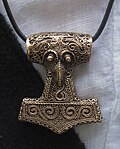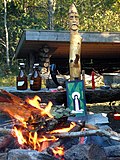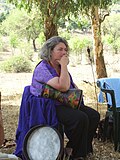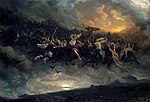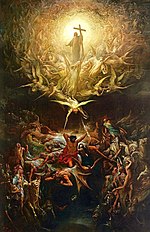Since its emergence in the 1970s, Neopaganism (Neuheidentum) in German-speaking Europe has diversified into a wide array of traditions, particularly during...
13 KB (1,637 words) - 08:35, 20 June 2024
Germanic paganism Christianisation of the Germanic peoples Modern paganism in German-speaking Europe Heathenry (new religious movement) a.k.a. German neopaganism...
293 bytes (67 words) - 08:45, 1 December 2023
Heathenry (new religious movement) (redirect from Modern Germanic paganism)
Germanic Paganism, or Germanic Neopaganism, is a modern Pagan religion. Scholars of religious studies classify it as a new religious movement. Developed in Europe...
115 KB (14,683 words) - 07:16, 19 September 2024
Modern paganism, also known as contemporary paganism and neopaganism, spans a range of new religious movements variously influenced by the beliefs of pre-modern...
158 KB (18,551 words) - 10:42, 25 September 2024
Modern paganism, also known as contemporary paganism and neopaganism, is a collective term for new religious movements which are influenced by or derived...
91 KB (9,938 words) - 02:51, 15 August 2024
by the ancient world. In the 20th century, it came to be applied as a self-descriptor by practitioners of modern paganism, modern pagan movements and Polytheistic...
45 KB (5,004 words) - 13:01, 13 September 2024
Modern paganism, also known as "contemporary" or "neopagan", encompasses a wide range of religious groups and individuals. These may include old occult...
12 KB (978 words) - 10:56, 26 September 2024
Pre-Christian Alpine traditions (redirect from Paganism in Austria)
communities. In the Alps, the relationship between the Roman Catholic Church and paganism has been an ambivalent one. While some customs survived only in the remote...
7 KB (786 words) - 03:12, 25 December 2023
thousand years in an area covering Scandinavia, the British Isles, modern Germany, the Netherlands, and at times other parts of Europe, the beliefs and...
128 KB (15,974 words) - 14:56, 12 September 2024
or paganism. This term is used most often outside of Greece. Some academics use the term 'ancient Greek religion' as a catch-all term in Greece, in order...
70 KB (8,153 words) - 06:12, 10 September 2024
Modern paganism and New Age are eclectic new religious movements with similar decentralised structures but differences in their views of history, nature...
35 KB (4,421 words) - 16:05, 1 August 2024
Wheel of the Year (redirect from Modern Germanic holidays)
("cross-quarter days") celebrated by Insular Celtic peoples. Different paths of modern Paganism may vary regarding the precise timing of each observance, based on...
52 KB (5,207 words) - 00:49, 7 September 2024
Slavic Native Faith (redirect from Neopaganism in Slavic Europe)
Russia, that paved the way for the rise of Rodnovery and other modern Paganisms in Eastern Europe. After the Soviet Union, the pursuit of Rodnovery matured...
257 KB (30,188 words) - 13:30, 25 September 2024
sought to move Germany away from Christianity towards a religion that was based on Germanic paganism and Nazi ideas. In 1933, Germany's population of almost...
7 KB (782 words) - 19:36, 2 August 2024
Aryan race (category Proto-Indo-Europeans)
Reagin, Nancy (2005). "3: German-Speaking People and German Heritage: Nazi Germany and the Problem of Volksgemeinschaft". In O'Donnell, K.; Bridenthal...
66 KB (6,764 words) - 17:46, 12 September 2024
Wild Hunt (category Germanic paganism)
stories represented a folkloristic survival of Germanic paganism, but this is disputed by other, modern scholars who claim that comparable folk myths are found...
55 KB (7,174 words) - 18:27, 7 September 2024
Valknut (category Germanic paganism)
Myths of Northern Europe. Penguin Books. ISBN 0-14-013627-4 Harvey, Graham (2007). Listening People, Speaking Earth: Contemporary Paganism (second ed.). London:...
11 KB (1,169 words) - 00:33, 20 August 2024
Polytheistic reconstructionism (redirect from Reconstructed Paganism)
reconstructionism) is an approach to modern paganism first emerging in the late 1960s to early 1970s, which gathered momentum starting in the 1990s. Reconstructionism...
9 KB (960 words) - 08:58, 30 August 2024
Greater Germanic Reich (redirect from Greater German Realm)
Iceland, Liechtenstein, and at least the German-speaking parts of Switzerland. The most notable Germanic-speaking exception would have been the United Kingdom:...
94 KB (11,600 words) - 07:43, 12 September 2024
self-designations. Heathenry appeared in the United States during the 1960s, at the same time as the wider emergence of modern Paganism in the United States. Among...
17 KB (1,989 words) - 04:50, 19 September 2024
Paganism is commonly used to refer to various religions that existed during Antiquity and the Middle Ages, such as the Greco-Roman religions of the Roman...
90 KB (11,638 words) - 14:41, 7 September 2024
Triple Goddess (Neopaganism) (redirect from Triple Goddess in Neopaganism)
The Modern Construction of Myth (2nd ed.). Indiana University Press. ISBN 978-0-253-33996-6. Clifton, Chas; Harvey, Graham, eds. (2004). The Paganism Reader...
53 KB (6,783 words) - 07:56, 27 September 2024
Since the 1980s, some modern druid groups have adopted similar methodologies to those of Celtic Reconstructionist Paganism in an effort to create a more...
66 KB (8,603 words) - 08:46, 9 September 2024
northern Germanic paganism. Celtic paganism and later Gallo-Roman syntheses were instead practised in western and southern parts of modern Germany, while Slavic...
100 KB (9,108 words) - 12:12, 21 September 2024
unify all the German-speaking populations of Europe in a single nation-state known as Großdeutschland (Greater Germany), where "German-speaking" was sometimes...
36 KB (4,001 words) - 00:18, 26 September 2024
Germanic languages (redirect from Germanic speaking peoples)
names were based on the appearance of the two sets of endings in modern German. In German, the distinctive case endings formerly present on nouns have...
93 KB (9,514 words) - 11:22, 27 September 2024
Ancient Celtic religion (redirect from Celtic paganism)
Celtic religion, commonly known as Celtic paganism, was the religion of the ancient Celtic peoples of Europe. Because there are no extant native records...
61 KB (7,498 words) - 17:44, 15 September 2024
the Middle Ages (AD 500–1500), and the modern era (since AD 1500). The first early European modern humans appear in the fossil record about 48,000 years...
195 KB (22,971 words) - 05:34, 25 September 2024
Albanian paganism comprises the pagan customs, beliefs, rituals, myths and legends of the Albanian people. The elements of Albanian mythology are of ancient...
126 KB (14,269 words) - 11:42, 26 September 2024
the Slavs, Southeast Europe turned to paganism and entered the Dark Ages, alongside most of post-Roman Europe.[citation needed] Many Slavs soon began...
39 KB (4,831 words) - 03:27, 20 July 2024

